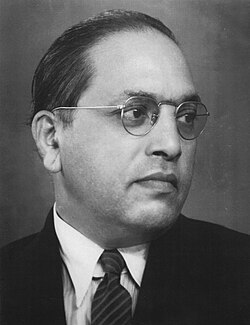Persons

| Name | Nationality | Notes | Refs. |
|---|---|---|---|
| B. R. Ambedkar | Indian | First law minister of India, founder of Navayana Buddhism | [1] [2] |
| S. N. Goenka | Burmese-Indian | the Foremost Lay Teacher of Vipassana meditation of Modern Time, Founder of multitude of Meditation Centers all-over the World, Raised in a Staunch Conservative Hindu Family in Burma. | [3] [4] |
- Balachandran Chullikkadu (born 1957), Malayalam language poet from Kerala [5]
- Laxman Mane (born 1949), author and social worker. [6]
- Swami Prasad Maurya, politician [7]
- Udit Raj (born 1958), prominent Indian social activist and Buddhist polemicist [8]
- Rahul Sankrityayan (1893–1963), Hindi author and translator [9]
- Iyothee Thass (1845–1914), Siddha practitioner and leader of the Dravidian movement [10]
- Lenin Raghuvanshi (born 1970), activist, one of the founding members of People's Vigilance Committee on Human Rights (PVCHR) [11]
- Lalai Singh Yadav (1921–1993), a social justice activist and play writer. He translated Periyar E. V. Ramasamy's The Key To Understanding True Ramayan from Tamil to Hindi as Sachi Ramayan Ki Chabi [12]